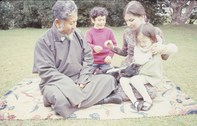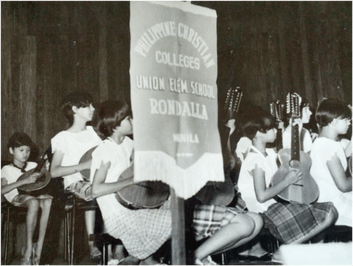
Section “Light" in 6th grade is owned by Miss Roque's bubble haircut and sailor dress. She's strict, fair, and irritable in a smart way.
As Protestants, we're caught up in a Hollywood craze about irrepressible nuns. In “Trouble with Angels”, Haley Mills is an orphan who attends a convent school. Rosalind Russell is Mother Superior who can't discipline her. Debbie Reynolds scoots cheerfully around in a wimple with a guitar slung over her back in “The Singing Nun".
Miss Roque is tired of teaching religion, so she dedicates one quarter to The Singing Nun. "Class, who will learn the songs for us?" Phyllis and I win the lotto. It's a labor of love. Phyllis patiently lifts and resets the needle on the vinyl disc as I scribble lyrics to “I have found the Lord,” and “Among the Stars” and so forth.
What they didn't tell us: The real singing nun, Belgian Soeur Sourire started singing to raise money for her order. Her Reverend Mother wouldn’t allow her tape to be aired on the Ed Sullivan show, so Sr. Sourir left the order, changed her name to Luc Dominique, became world famous, was hounded by the Belgian government for back taxes on royalties that she’d donated to the order and eventually committed suicide.
In sixth grade, far beyond the stars, Phyllis decides to run for president of the student body.
"Will you be my campaign manager?"
"OK," I say, but I worry about her lack of judgement. My political skills are a slight improvement over home economics. She loses by a single vote against daughter of our third grade teacher. The next year, our UES president runs away from home with her beloved, so Phyllis should have guided our ship of state.
Then, "the hills are alive" Julie Andrews sweeps into town with her soundtrack.
Oh, those years of the sound of music. We strum our new guitars during recess and after class and queue up for the new rondalla, the Filipino 5-string instrument orchestra. Girls play the 14-string banduria, which carries the melody and tenor, and the laud ( la-ud, to rhyme with wood). The boys take on octavinas, a small guitar, the gitara adapted from the Spanish guitar with five strings, and also plucked the bajo, the four string acoustic bass. I want to play the laud but am assigned the banduria. The easier to drown me out.
Mr. Silos was a kind old master conductor who taught all our parts without a score. The best girls and boys learn musical phrases from him and teach the rest of us. Our last year of elementary school ends with a splashy music and dance "Kagalakan" at the Phil-Am Auditorium. But you have to sell your own tickets to raise money for the extravaganza. Phyllis and I set out for the Batasan, Philippine congress. As we arrive at the congressional offices, the legislative staff turn to an invisible senator or representative and say “Sir, a kana and daughter of Monteclaro are here." We sold all our tickets, Feelees and I. Hair spray, make-up, stage lights, it's magic. I hate that shiny blue gown.
In a parallel universe, I am an American-in-training. My new real American friend Wendy Kinnier isn'r mk. Her dad is a consultant for the US military encamped in Makati. We sunbathe at the Seafront pool (you have to have US government privileges) and sleep over at her house in Magallanes subdivision. It's tough, this assignment. Americans are so walang hiya. Mr. Masangkay the lanky teacher of shop stops me in the hall one day as I am singing on my way to class.
"You are going to the US?"
"Yes, sir."
He gives a slight, sad shake of his head, and prophesies, "You will be changed." (in the twinkling of an eye, at the last trumpet).
"Oh, no sir, I won't change!" Urgent, shy and exposed.
His sad words hound me all the way through our American year 1968.
As Protestants, we're caught up in a Hollywood craze about irrepressible nuns. In “Trouble with Angels”, Haley Mills is an orphan who attends a convent school. Rosalind Russell is Mother Superior who can't discipline her. Debbie Reynolds scoots cheerfully around in a wimple with a guitar slung over her back in “The Singing Nun".
Miss Roque is tired of teaching religion, so she dedicates one quarter to The Singing Nun. "Class, who will learn the songs for us?" Phyllis and I win the lotto. It's a labor of love. Phyllis patiently lifts and resets the needle on the vinyl disc as I scribble lyrics to “I have found the Lord,” and “Among the Stars” and so forth.
What they didn't tell us: The real singing nun, Belgian Soeur Sourire started singing to raise money for her order. Her Reverend Mother wouldn’t allow her tape to be aired on the Ed Sullivan show, so Sr. Sourir left the order, changed her name to Luc Dominique, became world famous, was hounded by the Belgian government for back taxes on royalties that she’d donated to the order and eventually committed suicide.
In sixth grade, far beyond the stars, Phyllis decides to run for president of the student body.
"Will you be my campaign manager?"
"OK," I say, but I worry about her lack of judgement. My political skills are a slight improvement over home economics. She loses by a single vote against daughter of our third grade teacher. The next year, our UES president runs away from home with her beloved, so Phyllis should have guided our ship of state.
Then, "the hills are alive" Julie Andrews sweeps into town with her soundtrack.
Oh, those years of the sound of music. We strum our new guitars during recess and after class and queue up for the new rondalla, the Filipino 5-string instrument orchestra. Girls play the 14-string banduria, which carries the melody and tenor, and the laud ( la-ud, to rhyme with wood). The boys take on octavinas, a small guitar, the gitara adapted from the Spanish guitar with five strings, and also plucked the bajo, the four string acoustic bass. I want to play the laud but am assigned the banduria. The easier to drown me out.
Mr. Silos was a kind old master conductor who taught all our parts without a score. The best girls and boys learn musical phrases from him and teach the rest of us. Our last year of elementary school ends with a splashy music and dance "Kagalakan" at the Phil-Am Auditorium. But you have to sell your own tickets to raise money for the extravaganza. Phyllis and I set out for the Batasan, Philippine congress. As we arrive at the congressional offices, the legislative staff turn to an invisible senator or representative and say “Sir, a kana and daughter of Monteclaro are here." We sold all our tickets, Feelees and I. Hair spray, make-up, stage lights, it's magic. I hate that shiny blue gown.
In a parallel universe, I am an American-in-training. My new real American friend Wendy Kinnier isn'r mk. Her dad is a consultant for the US military encamped in Makati. We sunbathe at the Seafront pool (you have to have US government privileges) and sleep over at her house in Magallanes subdivision. It's tough, this assignment. Americans are so walang hiya. Mr. Masangkay the lanky teacher of shop stops me in the hall one day as I am singing on my way to class.
"You are going to the US?"
"Yes, sir."
He gives a slight, sad shake of his head, and prophesies, "You will be changed." (in the twinkling of an eye, at the last trumpet).
"Oh, no sir, I won't change!" Urgent, shy and exposed.
His sad words hound me all the way through our American year 1968.
Angel angel down we go
On the other hand, it is very hard to be mahinhin when you are luminous pink-white, knobby-kneed, and clumsy.
Elementary school is ending and the pretty girls are plunging ahead. I am too flat for a bra, all bones, elbows, hook nose. "Ang itangos ay ilong!" they whisper sotto voce in the jeepney. The nose is so big! Sometimes I wish I didn't know what they were saying. I also wish I had shiny black hair, not this curly brown that doesn’t obey. “Your hair doesn’t obey,” says Annie, whose short hair is very disciplined.
“Even though you are rough, I love you.” This is my only love note in elementary school. He means it as a complement.
There is one more trouble with angels movie I haven't mentioned: "Angel Angel down we go".
We drag out the Sound of Music so as to sneak into other forms of global teendom, which begins with the Beatles, Turtles, Herman's Hermits, and the Byrds' "Eve of Destruction". We have not yet smoked a joint or taken qualudes, so it is not yet the Eve of Destruction. Still, one can dream.
We sing without prescience:
But you tell me
Over and over and over again, my friend
Ah, you don’t believe
We’re on the eve...
In 7th grade one of my classmates, beautiful as Helen of Troy, runs off with her boyfriend. She tells me the sad story: they find them, her parents are furious out of their minds, they’re packing her off to Europe, she doesn’t want to go. She never even said ‘hi” to me and we’ve been in the same class since 4th grade. Same year, the daughter of my pious third grade teacher, also elopes with her boyfriend.
The next year, when we’re in the US, Mrs. Teves the dark, serious principle of UES is accused of lascivious behavior. Turns out she’s been living with a woman -- she’s a lesbian! The teacher pass around a petition to have her dismissed. So, it is hovering just outside out reach, the Eve of Destruction.
Elementary school is ending and the pretty girls are plunging ahead. I am too flat for a bra, all bones, elbows, hook nose. "Ang itangos ay ilong!" they whisper sotto voce in the jeepney. The nose is so big! Sometimes I wish I didn't know what they were saying. I also wish I had shiny black hair, not this curly brown that doesn’t obey. “Your hair doesn’t obey,” says Annie, whose short hair is very disciplined.
“Even though you are rough, I love you.” This is my only love note in elementary school. He means it as a complement.
There is one more trouble with angels movie I haven't mentioned: "Angel Angel down we go".
We drag out the Sound of Music so as to sneak into other forms of global teendom, which begins with the Beatles, Turtles, Herman's Hermits, and the Byrds' "Eve of Destruction". We have not yet smoked a joint or taken qualudes, so it is not yet the Eve of Destruction. Still, one can dream.
We sing without prescience:
But you tell me
Over and over and over again, my friend
Ah, you don’t believe
We’re on the eve...
In 7th grade one of my classmates, beautiful as Helen of Troy, runs off with her boyfriend. She tells me the sad story: they find them, her parents are furious out of their minds, they’re packing her off to Europe, she doesn’t want to go. She never even said ‘hi” to me and we’ve been in the same class since 4th grade. Same year, the daughter of my pious third grade teacher, also elopes with her boyfriend.
The next year, when we’re in the US, Mrs. Teves the dark, serious principle of UES is accused of lascivious behavior. Turns out she’s been living with a woman -- she’s a lesbian! The teacher pass around a petition to have her dismissed. So, it is hovering just outside out reach, the Eve of Destruction.
American Queen of Life
 https://www.loc.gov/item/2011648309/
https://www.loc.gov/item/2011648309/ I'm in 5th grade with the April 23 edition of Life magazine splayed on the floor at the Interboard Guest House, and am sqatting, checking the pictures of the "Coronation of Sikkim's Queen Hope" and hoping nobody will come by yet to make me put it back. Hope Cook is the American queen of Sikkim. She married Buddhist Crown Prince Palden Thondup Namgyal in 1963.
Who is reading this Life magazine back in America, under hair dryers in salons, or at the kitchen table making cookies. (What do American mothers do?) They think she is unimaginably exotic.
You’re not so far from nowhere, I say to her big white teeth. We’re all out here together. We are out here.
Who is reading this Life magazine back in America, under hair dryers in salons, or at the kitchen table making cookies. (What do American mothers do?) They think she is unimaginably exotic.
You’re not so far from nowhere, I say to her big white teeth. We’re all out here together. We are out here.


 RSS Feed
RSS Feed
